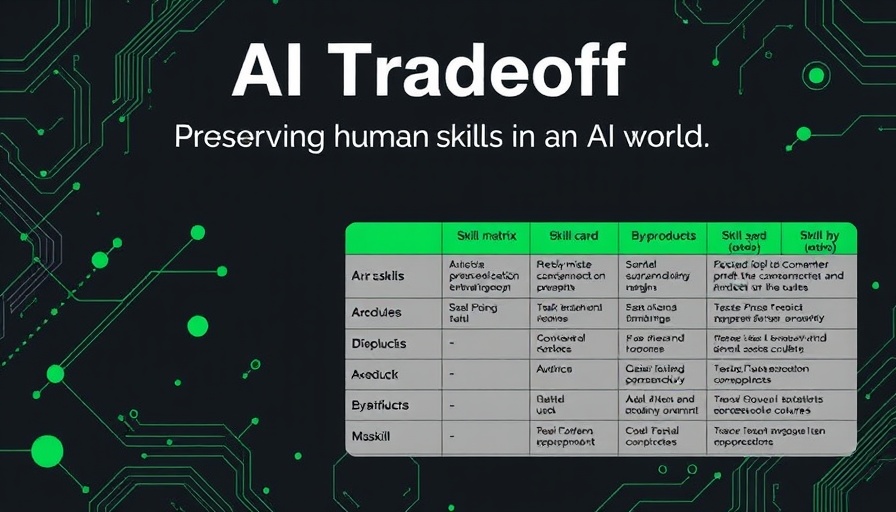
Understanding the Hidden Costs of AI Automation
As artificial intelligence continues to radically reshape the marketplace, many dealerships are leveraging technology for its potential to increase efficiency and reduce costs. Yet, as tasks previously performed by human workers become automated, it’s essential to consider the implications this shift has on skill development. While AI can expedite processes like prospecting and customer engagement, it risks diminishing the core competencies that salespeople must cultivate for long-term success.
The Skill Byproduct Framework: What It Means for Dealerships
The less tangible impact of automating skills—often referred to as 'skill byproducts'—has drawn attention from successful leaders in the go-to-market (GTM) space. Essentially, each task performed manually contributes to skill acquisition. If these tasks are automated prematurely, sales representatives may miss out on vital repetitions that lead to mastery. For dealership managers, fostering an environment where team members engage in manual tasks first, before turning to AI solutions, is crucial. This approach not only preserves skill maintenance but also sets the stage for success by allowing employees to hone their craft.
Strategies to Preserve Human Skills in an AI-Dominated Landscape
Forward-thinking dealership leaders are adopting several strategies to balance automation with the nurturing of human skills. Here are a few key tactics:
- Manual Before Automation: New team members at auto dealerships are often encouraged to complete core sales tasks manually. This foundational practice reinforces essential skills needed for effective selling.
- AI as a Coach: Rather than replacing human insight, AI can serve as a training tool. For instance, it can analyze calls to identify weaknesses in performance, enabling tailored coaching that enhances skill sets.
- Defining Good Performance: Developing a clear rubric that outlines what constitutes exemplary performance in sales allows for better coaching and AI analysis, ensuring salespeople understand the benchmarks.
- Maintain Creative Oversight: Encouraging sales reps to maintain their storytelling and relationship-building capabilities ensures that while technology assists them, it doesn’t substitute for human connection.
- Personalized AI Suggestions: Tools like HubSpot and Salesforce provide AI-driven suggestions, but the value lies in the reps refining those suggestions through their understanding and emotional intelligence.
The Future of Sales: Integrating Technology with Human Connection
The role of a salesperson is evolving, but the fundamental need for human connection remains. As technology becomes more integrated into the sales process, dealerships must face the challenge of not only adopting these new tools but also ensuring that their team’s human skills continue to thrive. It’s a balancing act that, if done right, can empower growth through both efficiency and customer satisfaction.
The Emotional Impact of Automation on Sales Staff
Dealership sales staff might feel a mix of excitement and apprehension concerning automation. While AI can make tasks easier, there’s often fear that it may make human roles obsolete. Leaders must acknowledge these concerns and actively involve their teams in discussions about AI’s role—transforming apprehension into empowerment.
Overall, dealers must navigate this challenging terrain intentionally to prevent skill erosion and safeguard the human elements of selling that are paramount for customer satisfaction and operational efficiency.
By fostering the right mix of human involvement and technological advancement, dealerships can better position themselves for resilience in an AI-driven future. As you implement AI tools in your dealership, consider how you can preserve and prioritize the invaluable skill sets that lead to engagement and success.
 Add Row
Add Row  Add
Add 




Write A Comment